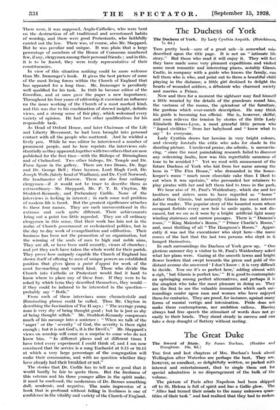The Duchess of York
The Duchess of York. By Lady Cynthia Asquith. (Hutchinson, 75. 6d.) Tins pretty book—sure of a great sale—is somewhat mis- described upon the title page. It is not an " intimate life story." But those who read it will enjoy it. They will feel they have made some very pleasant expeditions and visited some most romantic and interesting places, notably Glamis Castle, in company with a guide who knows the family, can tell them who is who, and point out to them a beautiful child playing in the distance, a little girl destined to delight the hearts of wounded soldiers, a debutante who charmed society and marries a Prince.
Now and then for a moment the sightseer may find himself a little wearied by the details of the grandeurs round him, the vastness of the rooms, the splendour of the furniture, the gardens which over-enrich description. He may think his guide is becoming too official. She is, however, skilful, and soon relieves the tension by stories of the little Lady Elizabeth Bowes-Lyon, a most graceful little person who " lisped civilities " from her babyhood and " knew what to say " to everyone.
Lady Cynthia draws her heroine in very bright colours, and cleverly forstalls the critic who asks for shade in the dazzling picture. Unrelieved praise, she admits, is unconvin- cing, " since the most painstaking research failed to discover any redeeming faults, how was this regrettable sameness of tone to be avoided ? " Yet we read with amusement of the future Duchess of York who hid from her nurse among the hens in " The Flea House," who demanded in the house- keeper's room " much more chocolate cake than I liked to eat when it was upstairs," who persuaded her retainers to play pirates with her and left them tied to trees in the park.
We hear also of St. Paul's Waldenbury, which she and her brothers and sisters seem to have regarded as " home " rather than Glamis, but naturally Glamis has most interest for the reader. The popular story of the haunted room whose occupant forbids every new heir to smile again, is not dis- cussed, but we see as it were by a bright artificial light many winding staircases and narrow passages. There is " Duncan's room," " King Malcolm's Room," Prince Charlie's Room," and, most thrilling of all " The Hangman's Room." Appar- ently it was not the executioner who slept here—the name comes of the fact that the last two persons who slept in it hanged themselves.
In such surroundings the Duchess of York grew up. " One glorious summer day a visitor to St. Paul's Waldenbury asked what her plans were. Gazing at the smooth lawns and bright flower borders that swept towards the green and gold of the distant avenue she answered ' I don't know : it is very difficult to decide. You see it's so perfect here,' adding almost with a sigh, ' but Glamis is perfect too.' " It is good to contemplate an upbringing among perfect alternatives, and perhaps it is the simplest who take the most pleasure in doing so. They are the first to see the valuable immunities which such sur- roundings confer upon men and women who have enjoyed them for centuries. They are proof, for instance, against many forms of mental vertigo and intoxication. Pride does not make them contemptuous, nor ambition callous. Having always had free speech the stimulant of words does not go easily to their heads. They stand steady in success and can take a deep draught of flattery without reeling.






































 Previous page
Previous page